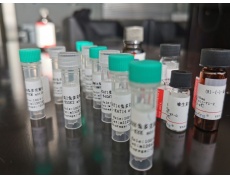中文名称: DMD抗原(重组蛋白)
英文名称: DMD Antigen (Recombinant Protein)
别 名: BMD; CMD3B; MRX85; DXS142; DXS164; DXS206; DXS230; DXS239; DXS268; DXS269; DXS270; DXS272
储 存: 冷冻(-20℃)
相关类别: 抗原
概 述:
|
Fusion protein corresponding to C terminal 250 amino acids of human DMD |
|
Full name: |
dystrophin |
|
Synonyms: |
BMD; CMD3B; MRX85; DXS142; DXS164; DXS206; DXS230; DXS239; DXS268; DXS269; DXS270; DXS272 |
|
Swissprot: |
P11532 |
|
Gene Accession: |
BC028720 |
|
Purity: |
>85%, as determined by Coomassie blue stained SDS-PAGE |
|
Expression system: |
Escherichia coli |
|
Tags: |
His tag C-Terminus, GST tag N-Terminus |
|
Background: |
The dystrophin gene is the largest gene found in nature, measuring 2.4 Mb. The gene was identified through a positional cloning approach, targeted at the isolation of the gene responsible for Duchenne (DMD) and Becker (BMD) Muscular Dystrophies. DMD is a recessive, fatal, X-linked disorder occurring at a frequency of about 1 in 3,500 new-born males. BMD is a milder allelic form. In general, DMD patients carry mutations which cause premature translation termination (nonsense or frame shift mutations), while in BMD patients dystrophin is reduced either in molecular weight (derived from in-frame deletions) or in expression level. |
 购物车
购物车 帮助
帮助
 021-54845833/15800441009
021-54845833/15800441009
